上海牛津英语六年级预初)英语知识点整理一)
牛津英语(上海版)6年级上学期知识点罗列(1)

牛津英语(上海版)6年级上学期知识点罗列(1)1. family 表示家庭的时候,它是单数名词表示家庭成员的时候,它是复数名词Tom’s family is a happy one. 家庭The Wang’s family go to America every year. 家庭成员FAMIL Y: F ather a nd m other I l ove y ou.2. grandfather 爷爷great-grandfather 曾祖父granddaughter 孙女great-granddaughter 曾孙女3. classmate 同学deskmate 同桌workmate 同事roommate 室友schoolmate 校友4. get sth. from sb. 从某人那里得到某物He doesn’t get any money from his parents.5. 频度副词always, usually, often, sometimes, seldom, never频度副词的位置:放在行为动词之前,be动词之后I sometimes watch TV with my grandmother.He is always late for school.6. What else do you do with her?What else 还有什么Who else will he meet? 他还要见谁?Where else will you go?---- else 用于特殊疑问词之后Anything else? 还有什么东西么?Anyone else? 还有谁么?1. exciting 令人兴奋的,使人激动的---通常修饰事物excited 感到兴奋的,感到激动的---通常修饰人interesting – interestedboring – bored 无聊的surprising – surprised 惊奇的2. who 主格whom 宾格whose 所有格My grandparents usually go to see a film with my mother. 对划线部分提问Who/Whom do your grandparents usually go to see a film with?3. Watching TV is one of the most important activities of the day.动名词短语做主语。
上海版牛津英语六年级上下全重点知识点复习整理1
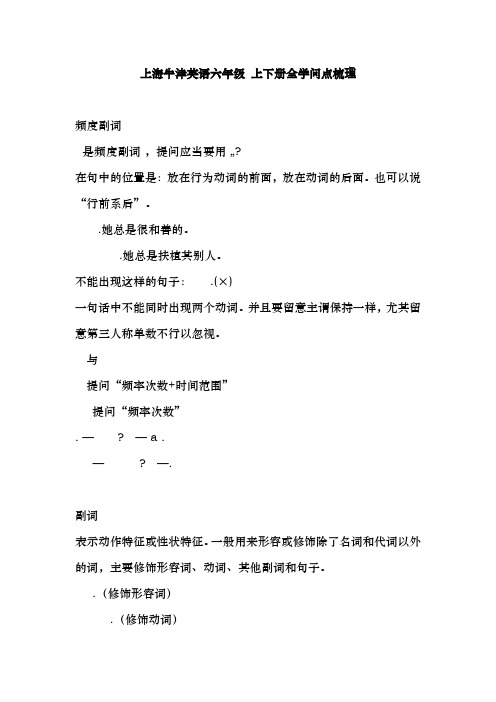
上海牛津英语六年级上下册全学问点梳理频度副词是频度副词,提问应当要用…?在句中的位置是:放在行为动词的前面,放在动词的后面。
也可以说“行前系后”。
.她总是很和善的。
.她总是扶植其别人。
不能出现这样的句子:.(×)一句话中不能同时出现两个动词。
并且要留意主谓保持一样,尤其留意第三人称单数不行以忽视。
与提问“频率次数+时间范围”提问“频率次数”. —? — a .—? —.副词表示动作特征或性状特征。
一般用来形容或修饰除了名词和代词以外的词,主要修饰形容词、动词、其他副词和句子。
.(修饰形容词).(修饰动词), .(修饰句子)形容词后面构成副词:—————————介词…?你和你的…还干什么?是个介词,后面接人称代词时,要用宾格的形式。
在详细的某一楼层只能用介词,并且第几层还要用序数词 , ,详细的某一天介词只能用,左边/右边的这个中间的这个假如是介词短语修饰,应当要放在后面,假如是形容词应放的中间在周末如今完成时如今完成时的构成是: +动词的过去分词。
去过,到过(表示如今已经回来)住在= /去,到….. (表示如今还没有回来). .I .…? 你去过…..吗?, I … . 是的,我已经去过了。
, I ‟t … . 不,还没有去过。
已经(多用于确定句,放于动词前)迄今,还(多用于疑问句和否认句,放于句末)刚刚(用法和位置和一样). I ’s .’s ?, I ’t ./ ……在…住/待…(时间)+一段时间,多与如今完成时连用表示动作从过去持续到如今的一段时间,并用提问。
代词用来指代一个人或事物,而用来指代一些人或事物。
定冠词定冠词的用法:a. 在球类运动前不加定冠词/ / , .b. 在乐器前必需加定冠词/ , .c. 在中,不加定冠词时辰表达方式/ 9月10日= a 2:15= 3:10= 1:30= 2:40= 30 用了后面就不能再有a a 一个半小时一小时二非常钟.分别表示上午和下午。
沪教版牛津英语六(上)语法点
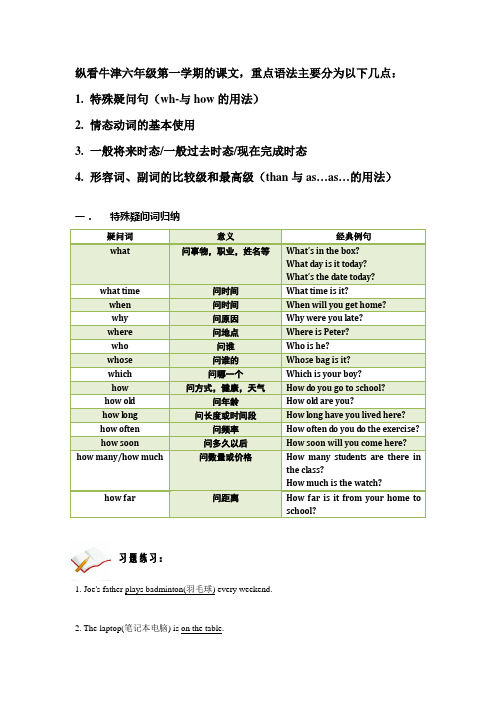
纵看牛津六年级第一学期的课文,重点语法主要分为以下几点:1.特殊疑问句(wh-与how的用法)2.情态动词的基本使用3.一般将来时态/一般过去时态/现在完成时态4.形容词、副词的比较级和最高级(than与as…as…的用法)一.特殊疑问词归纳疑问词意义经典例句what 问事物,职业,姓名等What’s in the box?What day is it today?What’s the date today?what time 问时间What time is it?when 问时间When will you get home?why 问原因Why were you late?where 问地点Where is Peter?who 问谁Who is he?whose 问谁的Whose bag is it?which 问哪一个Which is your boy?how 问方式,健康,天气How do you go to school?how ol d 问年龄How ol d are you?how long 问长度或时间段How long have you lived here?how often 问频率How often do you d o the exercise?how soon 问多久以后How soon will you come here? how many/how much 问数量或价格How many stud ents are there inthe class?How much is the watch?how far 问距离How far is it from your home toschool?习题练习:1. Joe's father plays badminton(羽毛球) every weekend.2. The laptop(笔记本电脑) is on the table.3. My mother is a nurse in the hospital.4. He gets up at 6:30 in the morning.5. Li Lei goes to work on foot.6. It is about 20 kilometers from my home to the town.7. I have lived in Hang Zhou for 20 years.8. I’m looking for my watch.9. The train will start in three minutes.10. Alice has the violin lesson twice a week.11. The building with green wall is the post office.12. He didn’t come because he was ill.注意事项:由于特殊疑问词孩子们从小学就已经开始接触,对于最基本的what/how/where等并不感到陌生,出题的难度一般也不会很大。
(完整版)沪教版牛津英语六年级基础语法复习整理

(完整版)沪教版牛津英语六年级基础语法复习整理形容词比较级最高级<一>规则变化A. 单音节和不可拆双音节形容词1.以e结尾+r / sthuge-huger/hugestlarge- larger- largestsafe- safer- safest2.辅音字母+y结尾:去y + ier / iestheavy-heavier-heaviestdirty- dirtier- dirtiesthappy-happier-happiestearly-earlier-earliestfriendly-friendlier-friendliestangry-angrier-angriesthealthy-healthier-healthiesteasy-easier-easiest3.重读闭音节,以一个元音字母加一个辅音字母结尾:双写辅音字母+ er,est big-bigger- biggestfat- fatter- fattestthin- thinner- thinnesthot- hotter- hottestwet- wetter- wettestred- redder- reddest4.直接+ er/eststrong young old short clever newgreattallhighcheappoorrichsmallslowfastlightB. 部分双音节形容词, 多音节形容词famous- more famous- the most famousmodern – more modern – the most moderncareful- more careful- the most carefulbeautiful-more beautiful-the most beautifulexpensive –more expensive (less expensive)- the most expensive interesting- more interesting- the most interesting<二>不规则变化good/well-better –best bad/badly/ill-worse-worst little-less-least + u. n. (few-fewer-fewest) + c. n.many/much-more –most far-farther-farthest(距离)far-further-furthest (程度)<三>程度副词much 用来修饰形容词比较级cheap (便宜的),cheaper (更便宜)much cheaper (便宜得多), good better much better much faster much tallermuch more beautifulfast faster tall tallerbeautifulmore beautiful<四>too, very, quite, so, as …as ,not as /so …as, less …修饰形容词原级very/quite tall (很高),too tall (太高)so tall (如此高)as tall as(与某人一样高)not as tall as /not so tall as (不如某人高)= less tall 注意事项:1、形容词最高级前必须加the ;副词最高级前可加the ,也可不加thee.g. the biggest cities ;draw (the) best 2、much 可修饰比较级:……得多e.g. much taller ……高得多3、原级标志:very 非常;too 太;quite 相当;(not )as+原级+as (不)像……一样;less+原级不如……;so 如此(共五个)时态填空(一) 常用固定词组:A型. doinglike doing/ love doing/ enjoy doing 喜欢做某事hate doing 讨厌做某事finish doing 完成做某事practise doing练习作某事start doing / begin doing开始做某事What about doing…? / How about doing…? 做某事怎么样?be good at doing善于做某事be poor at doing不善于做某事Sb. spend(s) some time doing sth. 某人花时间做某事remember doing记住做过某事forget doing忘记做过某事see sb. doing看见某人正在做by doing通过做某事by not doing通过不做某事stop doing停止做某事instead of doing而不是做某事go doingB型. to dowould like to do / want to do想要做某事forget to do忘记要做某事remember to do 记得要做某事have/has to do不得不做某事had to do不得不做某事will have to do将不得不做某事plan to do计划做某事One's job is / was to do... 某人的工作是做某事like to do/love to do喜欢做某事start to do / begin to do开始做某事need to do需要做某事don’tneed to do/ don’t haveto do不需要做某事learn to do学习做某事promise to do / promise not to do保证做某事/保证不做某事tell sb. to do / tell sb. not to do 告诉某人做某事/告诉某人不做某事ask sb. to do / ask sb. not to do 叫某人做某事/叫某人不做某事It takes/took sb. some time to do sth.某人花时间做某事It’s timeto do sth. 做某事的时间到了C型. doLet sb. do让某人做help sb. (to) do帮助某人做Why not do...? 为何不做......?would rather do / would rather not do 宁愿做/宁愿不做had better do / had better not do最好做/最好不做may do可以做must do必须做will do 将要做would do想要做shall do 应该做should do应该做can't do不能做may not do 不可以做mustn't do不准做won't do将不做wouldn't do将不做shan't do将不做shouldn't do 不应该做do 不需要做needn’t(二) 五种常见时态:现在进行时公式:am/is/are +doing (现在分词)时间状语:now 现在listen 听look 看these days 最近eg.Look, they are planting trees.一般现在时(助动词do/does)公式:V. / V.+s/es/ies (动词原形或动词第三人称单数)时间状语:always 一直usually 经常often 常常sometimes 有时候once a week 每周一次four times a day 一天四次every year 每年How often 多久一次e.g.I usually take an underground to school.He often takes a bus home.一般过去时(助动词did)公式:V. +d/ed/ied或不规则(动词过去式)yesterday 昨天yesterday evening 昨天晚上ten years ago 十年前last week 上个星期in the past 在过去just now 刚才e.g.Ten years ago, he moved to Japan.I sent a letter just now.4. 一般将来时(助动词will/shall)公式:am/is/are going to +V. , will /shall +V. 时间状语:tomorrow 明天next week 下个星期this weekend 这个星期in the future 在将来Soon 很快,不久在15年后in 15 years’ timeHow soon 多久以后e.g.I will fly to America tomorrow.现在完成时(助动词have/has)公式:have/has +done (过去分词)时间状语:already 已经yet 尚never 从未ever 曾经just 刚才once 一次before 在......之前for 6 years 6年how long 多久e.g.I haven’t read this newspaper yet. Mary has already packed her things.。
沪教版牛津英语六年级上册知识要点总结
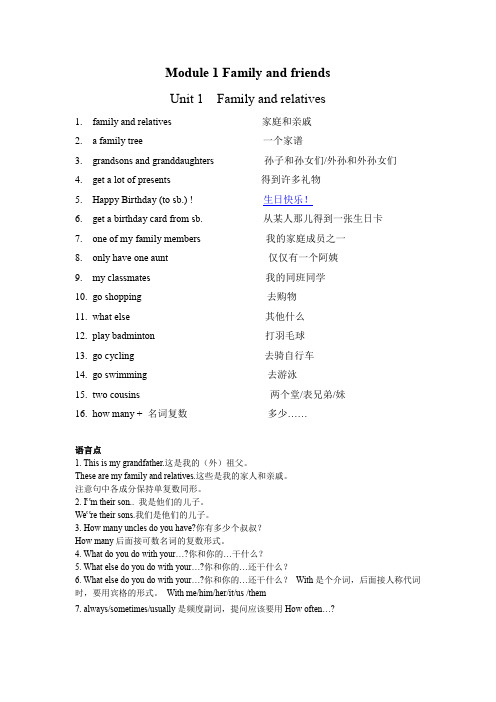
Module 1 Family and friendsUnit 1 Family and relatives1.family and relatives 家庭和亲戚2. a family tree 一个家谱3.grandsons and granddaughters 孙子和孙女们/外孙和外孙女们4.get a lot of presents 得到许多礼物5.Happy Birthday (to sb.) ! 生日快乐!6.get a birthday card from sb. 从某人那儿得到一张生日卡7.one of my family members 我的家庭成员之一8.only have one aunt 仅仅有一个阿姨9.my classmates 我的同班同学10.go shopping 去购物11.what else 其他什么12.play badminton 打羽毛球13.go cycling 去骑自行车14.go swimming 去游泳15.two cousins 两个堂/表兄弟/妹16.how many + 名词复数多少……语言点1. This is my grandfather.这是我的(外)祖父。
These are my family and relatives.这些是我的家人和亲戚。
注意句中各成分保持单复数同形。
2. I‟m their son.. 我是他们的儿子。
We‟re their sons.我们是他们的儿子。
3. How many uncles do you have?你有多少个叔叔?How many后面接可数名词的复数形式。
4. What do you do with your…?你和你的…干什么?5. What else do you do with your…?你和你的…还干什么?6. What else do you do with your…?你和你的…还干什么?With是个介词,后面接人称代词时,要用宾格的形式。
沪教牛津版六年级(预初)下册英语知识点归纳
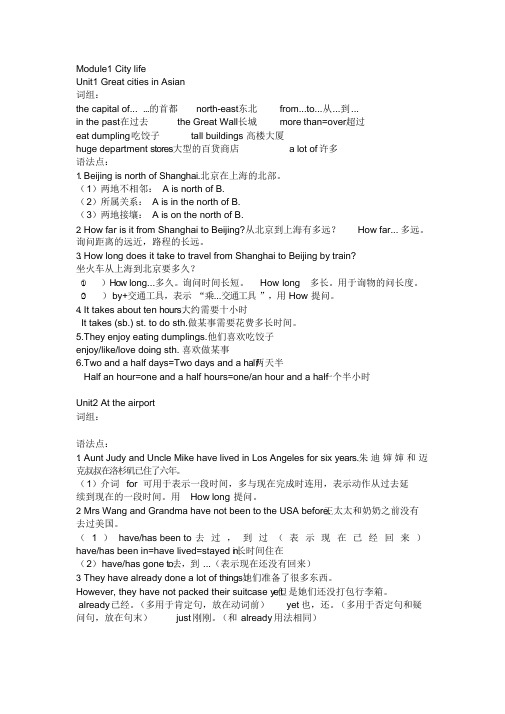
Module1 City lifeUnit1 Great cities in Asian词组:the capital of... ...的首都north-east东北from...to...从...到...in the past在过去the Great Wall长城more than=over超过eat dumpling 吃饺子tall buildings 高楼大厦huge department stores大型的百货商店 a lot of 许多语法点:1.Beijing is north of Shanghai.北京在上海的北部。
(1)两地不相邻: A is north of B.(2)所属关系:A is in the north of B.(3)两地接壤:A is on the north of B.2.How far is it from Shanghai to Beijing?从北京到上海有多远?How far... 多远。
询问距离的远近,路程的长远。
3.How long does it take to travel from Shanghai to Beijing by train?坐火车从上海到北京要多久?(1))How long...多久。
询问时间长短。
How long 多长。
用于询物的问长度。
(2))by+交通工具,表示“乘...交通工具”,用How 提问。
4.It takes about ten hours大.约需要十小时It takes (sb.) st. to do sth.做某事需要花费多长时间。
5.They enjoy eating dumplings.他们喜欢吃饺子enjoy/like/love doing sth. 喜欢做某事6.Two and a half days=Two days and a hal两f 天半Half an hour=one and a half hours=one/an hour and a ha一l f 个半小时Unit2 At the airport词组:语法点:1.Aunt Judy and Uncle Mike have lived in Los Angeles for six years.朱迪婶婶和迈克叔叔在洛杉矶已住了六年。
沪教版牛津英语六(上)语法点
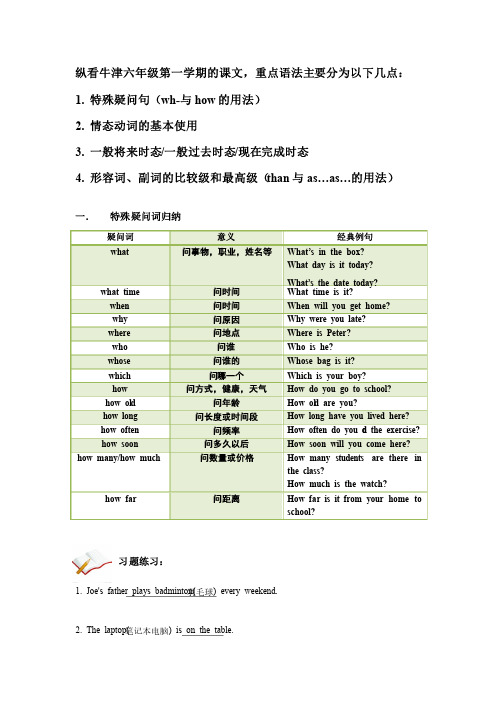
纵看牛津六年级第一学期的课文,重点语法主要分为以下几点: 1. 特殊疑问句(wh-与how 的用法) 2. 情态动词的基本使用3. 一般将来时态/一般过去时态/现在完成时态4. 形容词、副词的比较级和最高级(than 与as as……as as……的用法)一. 特殊疑问词归纳疑问词 意义经典例句what 问事物,职业,姓名等What’s in the box?What day is it today? What’s the date today? what time 问时间 What time is it? when 问时间 When will you get home? why 问原因 Why were you late? where 问地点 Where is Peter? who 问谁 Who is he? whose 问谁的Whose bag is it? which 问哪一个Which is your boy? how 问方式,健康,天气How do you go to school? how ol how old d 问年龄 How ol d are you? d are you? how long 问长度或时间段How long have you lived here? how often 问频率 How often do you d o the exercise? o the exercise? how soon 问多久以后 How soon will you come here? how many/how much 问数量或价格How How many many students are are there there in the class? How much is the watch? how far 问距离How How far far far is is is it it it from from from your your your home home to school? 习题练习:1. Joe's father plays badminton(羽毛球) every weekend.2. The laptop(笔记本电脑) is on the table. 3. My mother is a nurse in the hospital. 4. He gets up at 6:30 in the morning. 5. Li Lei goes to work on foot. 6. It is about 20 kilometers from my home to the town. 7. I have lived in Hang Zhou for 20 years. 8. I’m looking for my watch. 9. The train will start in three minutes. 10. Alice has the violin lesson twice a week. 11. The building with green wall is the post office. 12. He didn’t come because he was ill. 注意事项:由于特殊疑问词孩子们从小学就已经开始接触,对于最基本的what/how/where 等并不感到陌生,出题的难度一般也不会很大。
牛津上海六年级英语知识点
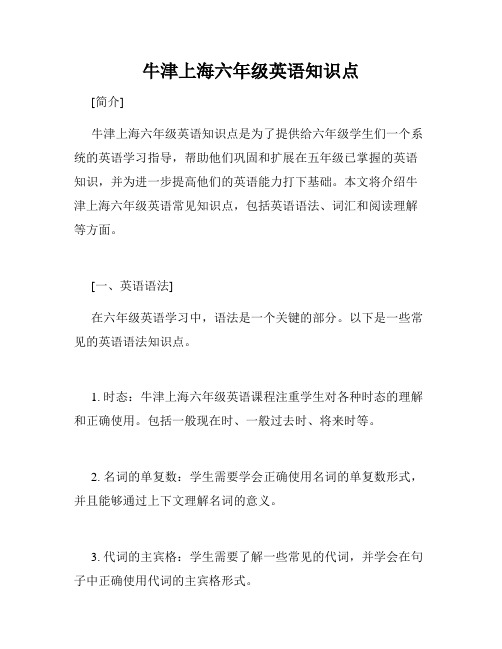
牛津上海六年级英语知识点[简介]牛津上海六年级英语知识点是为了提供给六年级学生们一个系统的英语学习指导,帮助他们巩固和扩展在五年级已掌握的英语知识,并为进一步提高他们的英语能力打下基础。
本文将介绍牛津上海六年级英语常见知识点,包括英语语法、词汇和阅读理解等方面。
[一、英语语法]在六年级英语学习中,语法是一个关键的部分。
以下是一些常见的英语语法知识点。
1. 时态:牛津上海六年级英语课程注重学生对各种时态的理解和正确使用。
包括一般现在时、一般过去时、将来时等。
2. 名词的单复数:学生需要学会正确使用名词的单复数形式,并且能够通过上下文理解名词的意义。
3. 代词的主宾格:学生需要了解一些常见的代词,并学会在句子中正确使用代词的主宾格形式。
4. 形容词和副词的比较级和最高级:学生需要学习形容词和副词的比较级和最高级形式,并能够正确运用于句子中。
5. 动词的不定式和动名词:学生需要学会区分动词的不定式和动名词形式,并且能够根据上下文理解其使用方式。
[二、英语词汇]在六年级英语学习中,词汇的掌握是非常重要的。
以下是一些常见的英语词汇知识点。
1. 基础词汇:学生需要熟练掌握一些常见的英语单词,包括表示人物、动物、食物等方面的词汇。
2. 时钟时间:学生需要学会用英语表达时间,并且能够读懂时钟上的时间。
3. 季节和月份:学生需要学会用英语表达四季和十二个月份,并且能够通过上下文理解相关的词汇。
4. 数字和计数:学生需要学会用英语表达数字,并且能够正确计数。
5. 学科词汇:学生需要学会一些与学科相关的词汇,比如数学、科学、地理等。
[三、阅读理解]在六年级英语学习中,阅读理解是培养学生阅读能力和理解能力的重要环节。
以下是一些常见的阅读理解知识点。
1. 阅读短文:学生需要学会阅读简短的英语短文,并且能够通过阅读内容回答问题。
2. 理解问题:学生需要根据短文内容,理解问题的意思,并能够准确回答问题。
3. 推理判断:学生需要通过上下文理解短文中的隐含信息,并能够进行推理判断。
- 1、下载文档前请自行甄别文档内容的完整性,平台不提供额外的编辑、内容补充、找答案等附加服务。
- 2、"仅部分预览"的文档,不可在线预览部分如存在完整性等问题,可反馈申请退款(可完整预览的文档不适用该条件!)。
- 3、如文档侵犯您的权益,请联系客服反馈,我们会尽快为您处理(人工客服工作时间:9:00-18:30)。
Module 1 Family and Friends
Unit 1 Family and Relatives
一、词汇及短语
1.relative n.亲戚,亲属(是可数名词,复数形式直接-s)
e.g. Mary is my close relative. 玛丽是我的近亲。
2.family n.家;家庭;家人(意为“家人”“家庭成员”时,谓语动词用复数;意为“家庭”
时,表示一个整体,谓语动词用单数)
e.g. This is my family. 这是我的家。
They are my family. 他们是我的家人。
常见短语:family tree家谱
3.granddaughter n.(外)孙女
4.grandson n.孙子;外孙
5.only adv.仅仅
6.member n.成员;会员
7.shop n.商店v.购物(shopped,shopping)
常见短语:bookshop(bookstore)书店shopping bag购物袋shopping centre购物中心go shopping=do some shopping去购物
8.else adv.别的,其他的
e.g. –What else do you want? 你还要别的什么吗?
-Nothing else, thank you. 不要别的了,谢谢。
注意else与other的区别,两者意思相近,但是else一般用来修饰不定代词、疑问代词、疑问副词,并后置。
而other只能修饰名词,且放在名词前。
someone else别人nothing else 没有其他的who else还有谁what else还要什么other people其他人other things其他东西other places其他地方
9.badminton n.羽毛球
10.cycle n.自行车v.骑自行车
常见短语:go to school by cycle=cycle to school骑自行车去学校
go cycling去骑自行车
go jogging慢跑
11.birthday card生日贺卡
12.watch TV/watch a film(movie)看电影/电视
13.a blank piece of paper一张白纸
14.a photo of一张…的照片
二、句子
1.Alice has got a lot of presents and birthday cards from her family and relatives.爱丽丝从她
的家人和亲戚那里收到了许多礼物和生日贺卡。
(“get…from…”从…得到…)
2.Make a birthday card for one of your family members or relatives.为你的家人或亲戚中的一
员做一张生日贺卡。
(“one of…”…其中之一)
3.I only have one aunt.我只有一个阿姨。
4.She is the only girl in her family.她是家里唯一的女孩。
5.Only three students failed in the PE examination.只有三个同学没通过体育测试。
6.Only you can help me.只有你能帮我了。
三、语法
1.How many/much…do you have?你有多少…?
e.g. How many books do you have? 你有多少本书?
How much bread do you have? 你有多少面包?
2.What (else) do you do with…?你(还)和你的…一起做什么?
3.频度副词
always总是;永远usually通常often经常sometimes有时
(1)注意频度副词在句子中的位置:
频度副词在句子中习惯上位于be动词、助动词之后,行为动词之前。
e.g. She is always late for school. 她上学总是迟到。
He usually goes to bed at about 12. 他通常十二点睡觉。
often可以放在句中,也可放在句尾,一般不放句首。
e.g. We have been there quite often. 我们经常到那儿去。
My grandma often goes for a walk after dinner. 我奶奶经常在晚饭后散步。
sometimes较特殊,既可以放在be动词、助动词之后,行为动词之前,也可以放在句首,还可以放在句中、句尾。
e.g. I sometimes think that it is a great mistake. 我有时想这事一个大错误。
Sometimes I help my mother in the house. 有时候我帮助妈妈做家务。
(2)对一件事发生的频率进行提问时,要用How often…?
e.g. How often do you go to the cinema? 你们多长时间看一次电影?。
